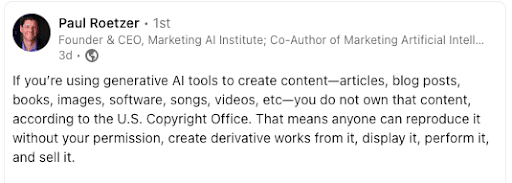
Artificial intelligence is reshaping the landscape of content marketing and SEO in profound ways. AI-powered tools have revolutionized content creation by making it more efficient and time-saving. However, businesses must tread carefully to avoid potential risks and pitfalls associated with using AI-generated content.
Brody Dorland and DivvyHQ: Insights from Industry Leaders
Brody Dorland and I, the co-founders of DivvyHQ, recently hosted a webinar to share our firsthand experiences with AI tools and to caution businesses about the implications of relying too heavily on AI-generated content. During the webinar, we discussed the emergence of new AI tools and addressed the increasing inquiries from our clients.
The Role of Human Expertise in Content Creation
While AI tools can assist in creating and editing content, they can never replace the human touch and expertise that is essential in content creation. Human-generated content remains indispensable in the content marketing industry. By exploring the capabilities of AI tools while remaining mindful of their limitations, businesses can stay ahead of the curve in content marketing and SEO trends.
The Intersection of AI, Content Marketing, and SEO
Understanding the dynamic relationship between AI, content marketing, and SEO involves weighing the benefits and risks of AI while acknowledging its limitations. Finding a balance between leveraging AI tools and preserving human creativity is key to successful content marketing strategies.
The Future of AI in Content Marketing
Will AI and content marketing coexist harmoniously in the future? This question sparks intriguing discussions about the evolving role of AI in shaping the content marketing landscape.
AI's Impact on SEO
We delved into the use of AI for SEO during our webinar. While some predict that AI will dominate the SEO realm, we caution against overlooking the inherent risks associated with AI-driven content strategies. Balancing AI's potential with its limitations is crucial for sustainable SEO practices.

Challenges and Opportunities in AI-Generated Content
AI's limitations in content creation, particularly in accessing real-time data and verifying information, pose challenges for businesses. While AI offers benefits such as time savings and idea generation, businesses must address the lack of human expertise and experience in AI-generated content.
AI presents a paradox where it can enhance certain aspects of content creation but falls short in replicating the authenticity and authority of human-generated content. Striking a balance between AI-driven tools and human creativity is essential for successful content marketing strategies.
Embracing AI Tools in Content Creation
Integrating AI tools like DivvyHQ into content creation workflows can streamline tasks such as spell-checking, grammar correction, and headline generation. While AI tools offer efficiency, businesses must remain vigilant about the risks and limitations associated with AI-generated content.
AI and Content Marketing: Finding the Right Balance
Despite the transformative potential of AI in content marketing, businesses must exercise caution and awareness of the risks involved. By continuously testing and exploring AI tools, businesses can maintain a competitive edge in the ever-evolving landscape of SEO and content marketing.
Frequently Asked Questions
How does marketing fit in with business strategy.
Marketing is an integral part of any business strategy. Without marketing, no one will know what your company has to offer. Marketing would be meaningless without sales. Marketing is essential for any business strategy.
Not everyone realizes how important marketing is. Marketing is often thought to be about advertising campaigns. Marketing is more than just advertising. Marketing is everything you do to promote your company's brand and position in the market.
So when you're thinking about your business, ask yourself these questions: What kind of image am I trying to convey? How will my customers view me? How should my world perceive me?
If you don't answer those questions, you haven't thought about marketing yet.
What is eCommerce Marketing?
Ecommerce marketing can be described as online shopping. It is the act or selling products over the internet. This includes buying goods from companies and selling them over the web. If you are an individual selling, this could include selling on eBay. You may also have a business set-up where you sell goods for profit. Selling products online is the best way to make money.
Here are some additional details on eCommerce marketing:
Creating a successful eCommerce site involves finding out what type of products you want to sell. You should then decide whether you will offer one item (such a book), multiple items (such DVDs and books), or both.
Once you know what you're offering, you'll need to find a supplier. A supplier can be a company that makes or sells the product you're looking for. You would, for instance, need to find a supplier that makes and sells greeting card products if you were to begin selling them.
Once you have found a supplier you will need to set up a website that displays the products and allows buyers to buy them. Some suppliers will provide templates, while others will require that you design the template. Once your website is up and running, it's important to market it in order to get visitors. This could include publishing articles on blogs or forums, advertising on Google Adwords websites and sending emails relevant to contacts.
There are several different channels available when it comes to promoting your eCommerce business. These include email and search engines as well as social networks and mobile apps.
- Email marketing is a popular choice for many businesses. It's cost-effective and easy to implement. And it delivers results. However, generating quality leads requires a lot of effort and time.
- Search engine optimization is a technique for improving the rank of a website for specific keywords. This is often done via link building, which allows pages to rank higher in search engine results.
- LinkedIn and Facebook are important for business promotion. These social networking sites are used daily by millions of people to communicate with their families and friends. Posting interesting content on these sites will help you get exposure to thousands more people.
- For eCommerce marketers, mobile apps can also be a great tool. People love shopping with their tablets and smartphones. An app allows customers to be reached wherever they may be.
eCommerce is a rapidly growing industry. There are many methods to promote your business. Choose wisely so you can reap the benefits of eCommerce marketing.
What are the main types of marketing?
Marketing is the act or communication of ideas, values and messages to consumers. Advertising and marketing are often interchangeable these days. Marketing does not just include advertising. Marketing is all communication that promotes and markets a product or service.
Marketing has three main components: branding, promotion, distribution. A company's branding is the way it represents itself to its target market. Promotion refers to attracting attention for your brand through paid advertising, promotions and other public relations activities. Distribution is the method of delivering your message to your target audience. You can do it through traditional media like radio, television, print, or email. However, new technologies make this easier than ever.
Social Media Marketing is an excellent way to market your business online. It is an excellent tool to spread brand awareness and generate leads and sales. Here are five social media marketing strategies to help your business grow.
- You can create a Facebook Fan page to allow you to interact with customers directly on Facebook. You can also upload files such as photos and videos.
- Twitter: Promote your business – Twitter is another great place for information sharing and connecting with people. To increase visibility, use hashtags
- Post Videos on YouTube – Uploading videos is very popular because many people enjoy watching them. If they like what they see they might click to visit your site.
- Host Live Events – Having live events allows you to meet face-to-face with potential clients. They can ask about your products and services.
- Respond to Customer reviews – Positive customer reviews increase trust and promote repeat purchases. Respond quickly to any negative comments.
How to build an Ecommerce marketing plan?
First, identify the products and services you wish to sell. This should include products and services related to your business but also have enough variety to keep customers interested.
The second step is determining how much money you need to spend on advertising, promotions, and other marketing techniques. Multi-channel marketing may be necessary, such as email blasts, direct mail, social media, search engine optimization and other methods.
Once you've determined how much money you require, you can create a budget. You might want to consult an expert in e-marketing if you aren't sure which marketing strategy is best for you business. They can help you determine which marketing method is best for your business.
Once you have a plan in place, it is time to implement it. It is possible to hire someone else to assist you in this process.
It doesn't mean you have to start over. Be sure to use proven strategies that are working for other online sellers. Remember to test everything before making any changes.
You should never forget that your ultimate goal is to increase sales and profits. Your eCommerce marketing strategy should consider both long-term and short-term goals.
Our article on eCommerce marketing tips will help you increase your sales. We hope they can help you achieve your goals!
What are some examples of indirect marketing?
There are many indirect marketing strategies that you can use to promote and grow your business. One way is to encourage people on social media to share pictures of yourself using your product. This could spread awareness of your brand.
You could advertise in the local paper if your auto shop is open. This would encourage people to take their cars to your shop instead of visiting other shops.
Another example is to send coupons to customers via e-mail or place ads on bulletin boards at public locations.
Direct marketing is a great option because it's not expensive.
You will need patience to promote your business. It takes time for people to trust you.
Keep track of the effectiveness of your campaigns. Measure the number and quality of leads that each method generates.
This will allow you to see which methods are most effective for your business.
How does search engine optimization work?
Search Engine Marketing is a key component of digital marketing. SEM includes pay-per-click advertising, sponsored links, display ads, paid inclusion, search engine optimization (SEO), social media marketing, video marketing, mobile advertising, etc.
Statistics
- In 2017, 34% of marketers cited co-branding as the most effective way to increase the number of email subscribers. (influencermarketinghub.com)
- According to statistics, 60% of online shoppers worldwide actively search for coupons before purchasing from a virtual shop. (influencermarketinghub.com)
- Many experts recommend you share 20% of your promotional content and 80% of other valuable content you find. (marketinginsidergroup.com)
- 81% of brands employ affiliate marketing, and eCommerce sites are particularly good candidates. (blog.hubspot.com)
- A poll earlier this year found that 14% of older Gen Z's had bought an item in the previous six months based on an influencer's recommendation. (influencermarketinghub.com)
External Links
statista.com
blog.hubspot.com
hubspot.com
influencermarketinghub.com
How To
Six Types Of Ecommerce Marketing
How do I market an eCommerce store?
Ecommerce marketing is one of the most challenging marketing tasks. This requires you to get to know your customers, their buying habits, and how they interact and use your products and services. This knowledge allows you to build an effective strategy to help you reach your goals.
There are six types or eCommerce marketing strategies.
- Product Strategy – The first thing you need to do is decide which product you want. There are three major categories: physical goods (things), virtual goods (services) and membership sites. Once you have chosen the category that you wish to work with, it is time to decide whether you want to offer wholesale or retail pricing. Wholesale pricing is when you decide the price at which you will sell your products. Retail pricing means that you charge your customers directly for your products.
- Pricing Strategy – Next, you need to figure out how much you want to make from selling your products. Profit margins should be taken into consideration, as well as competition, shipping costs and taxes. Two ways to increase profits are possible when pricing your strategy: reduce your cost per sales and/or increase the volume of your sales.
- Promotion Strategy – This is where the fun begins! A promotion strategy must be developed that best suits your business. Promo strategies that work best for your business include free shipping, special deals, discounts, coupons, and other offers. If you don’t have any ideas for promotional products, brainstorm some.
- Shipping Strategy – After you've figured out how to promote your products, you need to think about how you will get them to people. Will you ship via USPS/FedEx, UPS, DHL or another delivery method? Will you use a fulfillment company or will you be doing it all yourself?
- Merchandise Management System: Your merchandise management software includes software that allows you to manage inventory, track orders and fulfill orders. You have many options depending on your budget and preference.
- Customer Service Strategy. Finally, you will need to devise a customer services strategy that is both effective and profitable for your business. Will you provide telephone support or email support? Customers can reach you via phone, social media, or postal mail.
————————————————————————————————————————————–
By: 6708
Title: AI and Content Marketing: A Game Changer in the Digital Landscape
Sourced From: internetlib.org/ai-and-content-a-love-story-or-a-disaster-in-the-making/
Published Date: 5/3/2023 4:45:32 PM
